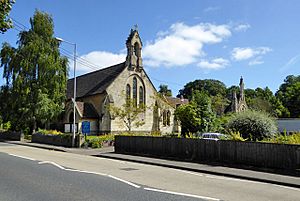St Peter's Church, Devizes facts for kids
Quick facts for kids St Peter's Church, Devizes |
|
|---|---|

St Peter's, Devizes, as seen from the Bath Road
|
|
| 51°21′14″N 2°00′22″W / 51.354°N 2.006°W | |
| Country | England |
| Denomination | Church of England |
| Churchmanship | Traditional Anglo-Catholic |
| History | |
| Status | Active |
| Dedication | St. Peter |
| Consecrated | 24 July 1866 |
| Architecture | |
| Functional status | Parish church |
| Heritage designation | Grade II listed |
| Architect(s) | William Slater and Richard Carpenter |
| Groundbreaking | 30 June 1865 |
| Completed | 1866 |
| Administration | |
| Parish | Devizes |
| Archdeaconry | Wiltshire |
| Diocese | Diocese of Salisbury |
| Province | Province of Canterbury |
St Peter's Church is a special church in Devizes, Wiltshire, England. It belongs to the Church of England. This beautiful building was built during the Victorian era, a long time ago. You can find it on Bath Road, just outside the main part of Devizes. It's one of four Anglican churches in the town and is part of the Anglican Diocese of Salisbury. The people who go to St Peter's Church are also part of a group called Devizes Churches Together.
Contents
History of St Peter's Church
Building the Church
St Peter's Church was built because Reverend Benjamin Dowding, who was the Vicar of St James's Church in Devizes, thought the town needed another church. He wanted a church closer to the Kennet and Avon Canal and the busy factories nearby.
The first stone for the church was placed on June 30, 1865, by Rev Dowding. The church was built between 1865 and 1866 by architects Slater & Carpenter. It was officially opened and made sacred on July 24, 1866, by Walter Kerr Hamilton, who was the Bishop of Salisbury. A special group called the Royal Wiltshire Militia even marched to the church for the opening ceremony!
Changes and Growth Over Time
Later, between 1884 and 1885, more parts were added to the church. These additions included the south aisle and a special room for the organ. These new parts were built by Weaver & Adye.
The first vicar, or priest, of St Peter's was Reverend Harold Grindle. Many vicars after him helped the church grow and develop its special style of worship. One important vicar was Canon Frederick Phipps, who served for 34 years. He introduced the Anglo-Catholic way of worship, which the church still follows today.
Another former vicar was Reverend Douglas Bryant. He was the priest at St Peter's for seven years and helped make the church a very spiritual place. He later became a Canon at Guildford Cathedral. His son, Mark Bryant, also became a bishop.
In recent years, St Peter's has become an active member of groups like Forward in Faith and The Society (Church of England). The church's council has also made decisions that show they do not support women becoming priests.
Inside the Church
Stations of the Cross and Icons
St Peter's Church has a beautiful set of Stations of the Cross. These are hand-carved wooden pictures that show different moments from the story of Jesus's journey to the cross. They are placed around the walls of the church.
The church also has a collection of icons. Icons are special religious paintings or images. Among them are icons of St Paul and St Peter. The icon of St Peter was a gift to the church from a former member named Estelle Holloway.
Past Priests of St Peter's
Here is a list of the priests who have served at St Peter's Church over the years:
| Priest's Name | From | To |
|---|---|---|
| Harold Grindle | 1866 | 1885 |
| Arthur Devas | 1885 | 1901 |
| Frederick Phipps | 1901 | 1935 |
| George F. George | 1935 | 1939 |
| Cyril Reeves Palmer | 1939 | 1941 |
| Sidney Wyman | 1941 | 1944 |
| George Hamilton Douglas | 1944 | 1950 |
| Douglas Bryant | 1950 | 1957 |
| Vernon Thomas | 1957 | 1966 |
| Henry Maude | 1966 | 1974 |
| John Croft | 1974 | 1985 |
| Brian Tigwell | 1985 | 1999 |
| Leslie Attwood | 2000 | 2002 |
| Peter Moss | 2005 | 2013 |
| Vincent Perricone | 2014 | 2020 |
The Church Organ
St Peter's Church has a large pipe organ. It was built in 1898 by Griffin and Stroud. This organ has two "manuals," which are like keyboards that the organist plays. You can find more details about this organ on the National Pipe Organ Register.
 | Roy Wilkins |
 | John Lewis |
 | Linda Carol Brown |

